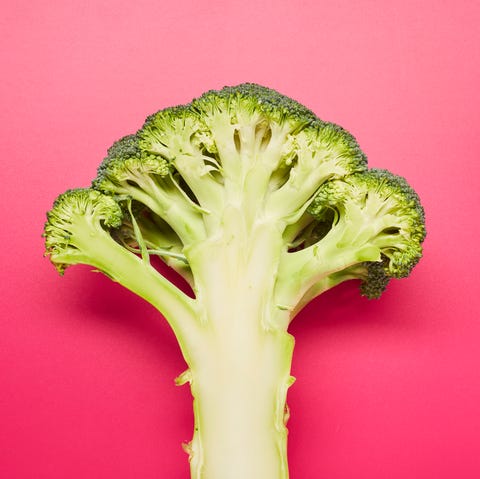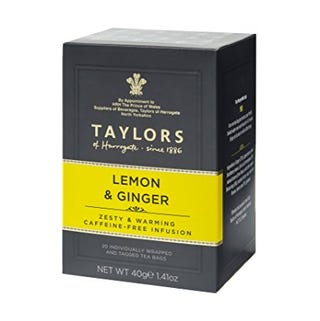How to Get Rid of Extreme Bloating and Gas
We all pass gas (and burp)—it's natural and it has nothing to do with air and bacteria. "The GI tract doesn't absorb air and gas well, so almost all of it eventually comes out northbound or southbound," says Patricia Raymond, M.D., a gastroenterologist in Norfolk, VA. As gut bugs ferment carbohydrates from food, they produce gas, which then exits through your backside. And the air you swallow while eating, talking, and breathing rises back up to be expelled via your mouth. When gas passes too slowly or too much builds up, that can make your belly bloat.
Gas usually isn't harmful, but if bloating persists, see a doctor, especially if it's accompanied by abdominal pain more severe than the "pop an antiacid" kind, diarrhea, constipation, vomiting, weight loss, or frequent heartburn—all signs that an issue like irritable bowel syndrome or celiac disease may be involved.
How to Prevent Gas, Pain, and Bloating
Limit "problem" foods.

Easy Meal Plans, Recipes, and Tips to Calm Your Gut
If the small intestine lacks specific enzymes, certain foods can make it to the colon without being broken down, providing a feast to gas-generating bacteria. If you often battle gas, limit problem foods like high-fiber beans, peas, cabbage, onions, broccoli, cauliflower, and prunes as well as milk. Eat more slowly too—you'll swallow less air than when you shovel it in. "This reduces burps and prevents large amounts of food from reaching the intestines all at once and causing gas," says Aasma Shaukat, M.D., spokesperson for the American Gastroenterological Association.

the_burtons Getty Images
Breathe deeply.
Practicing meditation or mindful breathing trains the body to draw out air deeply into the lungs instead of taking short breaths that direct air into the esophagus. It also reduces stress and anxiety, both linked to increased sensitivity to gas. "There's a brain-gut axis, so calming the brain helps regulate the autonomic nervous system in the GI tract, which can lead to less gas," Dr. Shaukat says.
Get moving.
Exercise pushes foods through the GI tract faster, reducing constipation, bloating, and gas, says Dr. Raymond. It also releases endorphins that relieve stress and help the nervous system regulate the gut. Aim to get 30 minutes of physical activity three to five times a week.
This content is imported from {embed-name}. You may be able to find the same content in another format, or you may be able to find more information, at their web site.
Reduce gluten.
Too much gluten in your diet can cause digestion issues for many people. "Even if you don't have celiac disease, ingesting less wheat often improves gas symptoms if you have an intolerance to gluten in wheat, rye, and barley," Dr. Raymond says.
Do kegels.
Strong pelvic floor muscles can help keep gas from escaping at socially unacceptable times, Dr. Shaukat says. Practice tense up as if holding in urine for three seconds, then relax for three seconds and repeat.
13 to 21: The number of times people usually fart every day, most often after meals. Women's farts tend to be stinkier than men's due to higher concentration of odoriferous chemical hydrogen sulfide.
Keep a food journal.
While there are a host of foods that commonly cause people problems, everyone has different sensitivities. So it's best to observe and note when you are feeling particularly bloaty so you can rule things out.
"If you run into a hard, puffy stomach quite often, it may be due to certain food intolerances," says Taz Bhatia, M.D., an integrative health expert and founder of CentreSpring MD. "I always recommend keeping a food journal in these cases. Being able to go back and see which foods seem to cause these types of symptoms can keep a bloated belly at bay."
The Best Treatments for Gas and Bloating

BEST SOFTGELS
Gas-X Extra Strength Softgels
The coating on these soft gels makes them easy to swallow, which is helpful if you're not the best at taking down pills. (They come in chewables too.) The active ingredient, simethicone, encourages tiny gas bubbles to merge together so you can expel them easier and relieve some of that painful pressure.

BEST LIQUID
Mylanta Antacid and Gas Relief
This minty liquid medicine coats the stomach, helping to relieve gas, bloating, and any acid indigestion right away—thanks to a combination of active ingredients (simethicone, aluminum hydroxide, and magnesium hydroxide).

BEST CHEWABLES
Lactaid Fast Act Lactose Intolerance Chewables
If dairy is your downfall, chowing down on these tablets before you indulge in a scoop of ice cream or a fresh mozzarella panini should help a lot. They contain a natural enzyme, lactase, which helps break down the lactose in milk products that you'd otherwise have trouble digesting.

NATURAL PICK
Taylors of Harrogate Lemon & Ginger Herbal Tea
Did you know that lemon is a natural detoxifier? It acts as a cleansing agent, which, Taz explains, helps to eliminate unwanted bloat from the body. She recommends sipping on hot lemon water in the morning. Or try balancing your digestive system with this caffeine-free herbal tea.
Additional reporting by Amy Schlinger
Like what you just read? You'll love our magazine! Go here to subscribe. Don't miss a thing by downloading Apple News here and following Prevention. Oh, and we're on Instagram too .
This content is created and maintained by a third party, and imported onto this page to help users provide their email addresses. You may be able to find more information about this and similar content at piano.io
How to Get Rid of Extreme Bloating and Gas
Source: https://www.prevention.com/health/a20472936/best-remedies-for-gas-and-bloating/